King Charles banknotes enter circulation
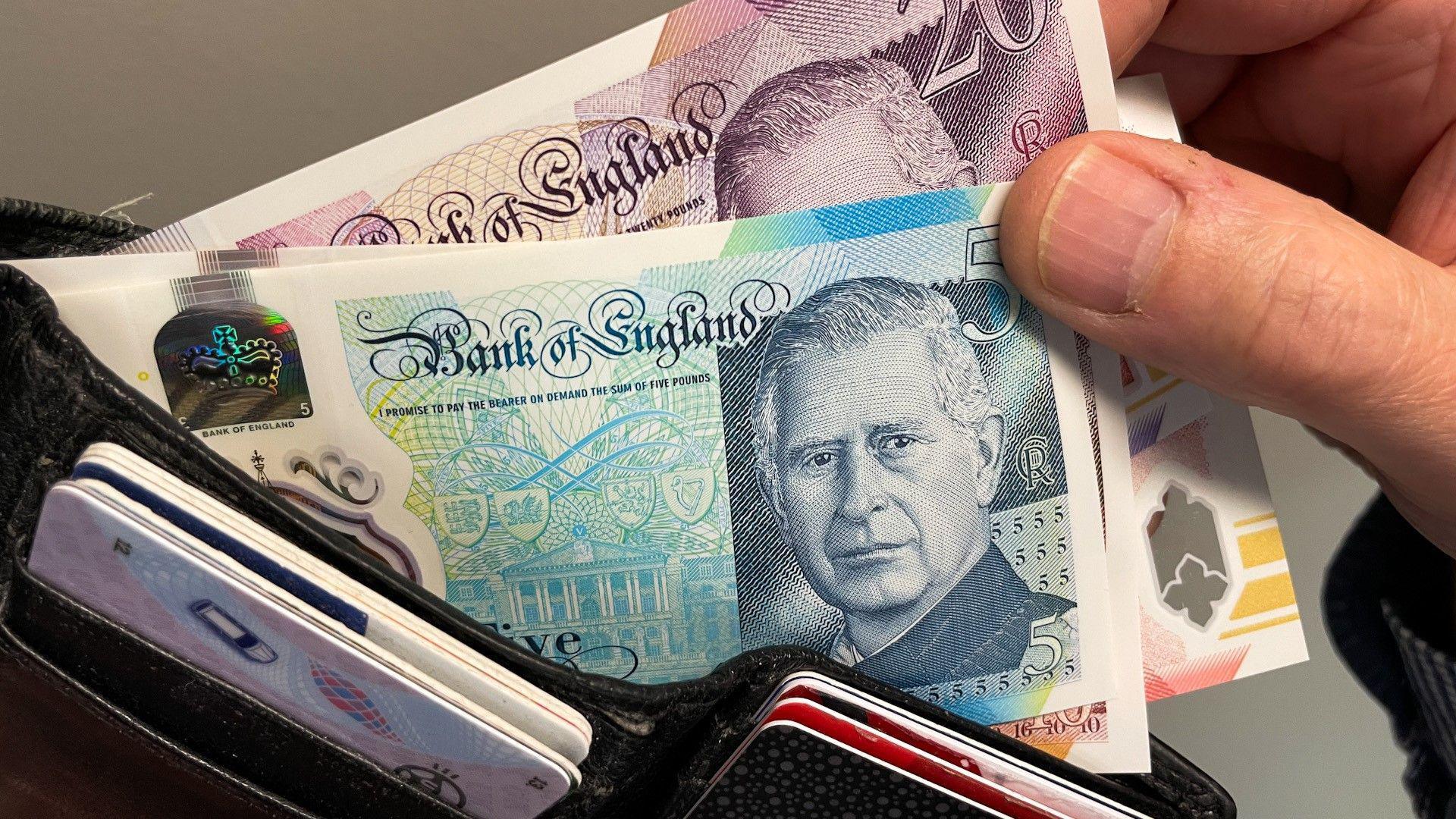
The portrait is the only change to existing banknotes
- Published
New banknotes featuring the portrait of King Charles III have now entered circulation, but it may be some time before they are commonly seen in wallets and purses.
The new Bank of England notes will gradually replace those which are damaged, or will be issued when demand increases.
The King is only the second monarch to appear on these notes, with Queen Elizabeth II first featuring in 1960.
Shoppers can still use current circulating £5, £10, £20 and £50 notes carrying the portrait of the late Queen.
The reverse side of current polymer Bank of England banknotes, which in ascending order feature Sir Winston Churchill, Jane Austen, JMW Turner and Alan Turing, are unchanged. Notes issued in Scotland and Northern Ireland feature other images, and not the monarch.
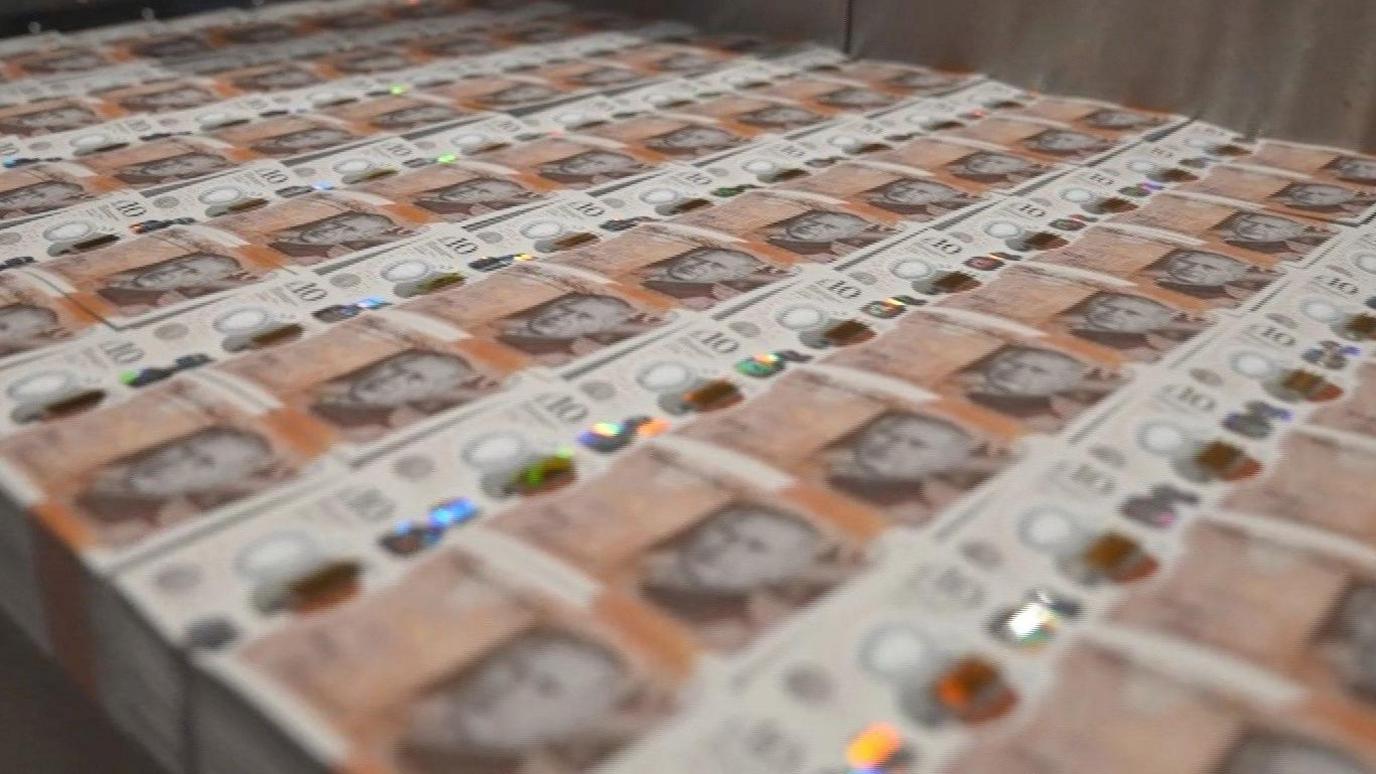
The first banknotes were printed months ago, ready for the start date
The first new banknotes were printed last year, with the long lead-in time allowing automated machines that accept cash to be updated to recognise the new designs. The King's portrait is based on a picture taken in 2013.
Cash, Cornwall, the King and I
- Attribution
In April last year, the BBC was given exclusive access to the highly-secure site where the notes are being produced.
A year on, the King was presented with a full set with the lowest serial numbers, following the tradition of the monarch receiving the first issues of new banknotes.
Collectors seek banknotes which come as close to the 00001 serial number as possible.
The Post Office reported collectors visiting branches which had stocks of the notes during the day.
There was an early queue outside the Bank of England in London, where an exchange service is in operation, external until 11 June, with a limit of £300. It is also running a postal service with the same limit until 30 June, with an application form required to be completed.
Volunteers at the Bank said around 200 people visited on Wednesday to exchange their notes.
Student Sean Brown, 20, travelled from Hertfordshire to get one of the first notes.
"Since I was young I've been collecting coins so I wanted to be here for this monumental occasion," he said.
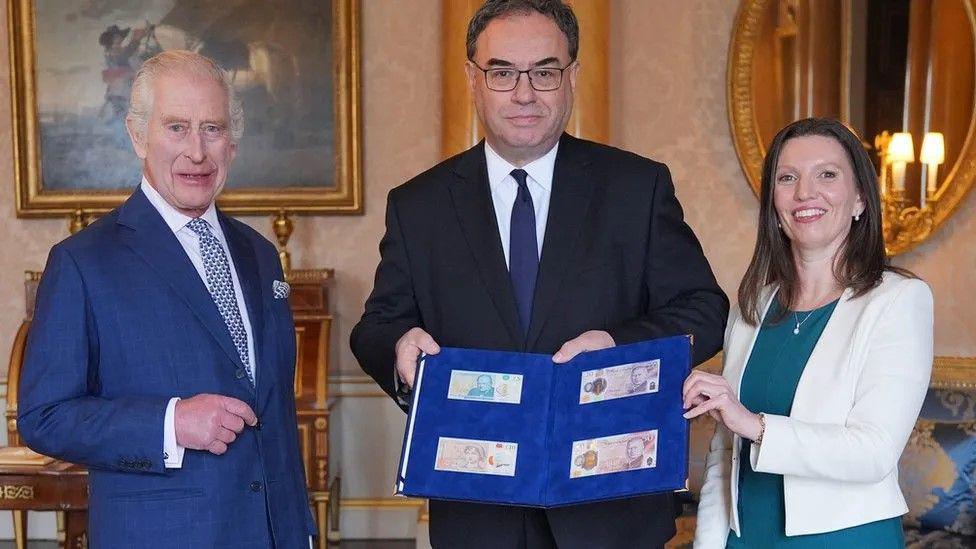
The first of the new notes were presented to the King by the Bank of England governor Andrew Bailey and chief cashier Sarah John
While the King is appearing on banknotes, cash may be disappearing from our lives.
"This is a historic moment, as it’s the first time we’ve changed the sovereign on our notes," said Bank of England governor, Andrew Bailey.
"We know that cash is important for many people, and we are committed to providing banknotes for as long as the public demand them."
But a survey for Link, the UK’s cash access and ATM network, found that nearly half (48%) of those asked said they expected a cashless society during their lifetime.
However, the same proportion said this would be problematic, and 71% of those surveyed said they still had some level of everyday reliance on cash.
Yet figures from consumer association Which? found that 6,000 bank branches had closed in the last nine years, leaving many places with none at all and limited access to cash.
Cash payments rise for first time in 10 years
- Published14 September 2023
Asda to go cashless at more petrol forecourts
- Published25 January 2024
Fifty of them now have banking hubs - shared premises, often run by the Post Office - where customers of any bank can withdraw and deposit cash, and where community workers from different banks visit once a week.
One of the more unusual is in the harbour town of Looe in Cornwall, a county with rich connections to King Charles.
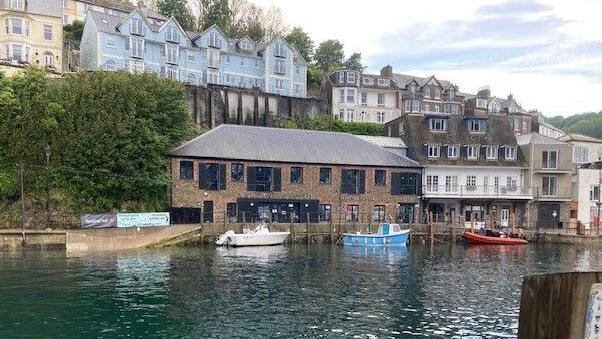
The banking hub in Looe is in one of the more picturesque spots in the country
The hub is found behind a cafe and heritage centre and underneath a top restaurant, where the entrance to a climbing wall used to be.
"People can come to take money out, put money in, they can deposit cheques, we give change for local businesses," said Debbie Young, manager at the hub.
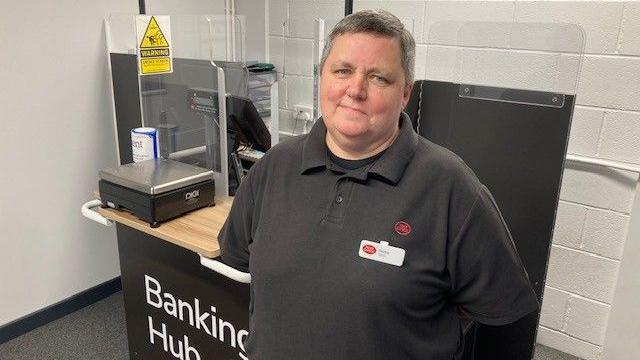
Debbie Young says the hub serves a cross-section of the local community
"People come to pay their bills and top up their gas and electric."
With the last bank having closed 18 months ago, the hub is a lifeline, according to Ange Harrison, who manages the coffee shop in front of the hub.
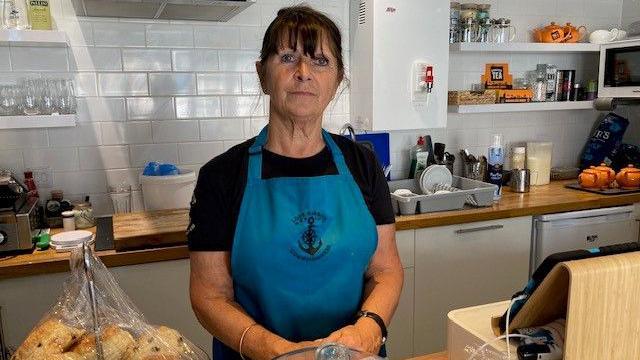
Ange Harrison says glitchy internet and a fear of scams mean the hub and cash is needed
"Obviously you can bank your cash right away, you don't have to worry about having cash on the premises," said Mrs Harrison, a former fishmonger who has lived in Looe all her life.
"For all the businesses in the town, they need to use it. You know that old saying - if you don't use it, you are going to lose it."
That was true too of cash, and she said people were curious to see the new banknotes featuring the King.
Post Office branches where the notes will be available first are at Piccadilly Plaza in Manchester, M2 1BB; Sunderland City, SR1 1RR; Portsmouth, PO1 1AB; Birmingham, B2 4AA; City of London, EC2M 5TE; Moorgate, EC2M 5TE; Broadway, SW1H 0AX; Great Massingham, PE31 6HP; Tetbury, GL8 8DB; Minchinhampton, GL6 9BN; Windsor, SL4 1AA; Houndsditch, E1 7BS; Woodstock, OX20 1SP; and Poundbury, DT1 3AZ.
It will be a slow change for our change - but there are still longer-term questions over the future of notes and coins.
Where the King's image now features
Coins December 2022: Millions of 50p coins with the King's image entered circulation. Other new coin designs, such as a bee on the pound coin, were introduced towards the end of 2023.
Stamps March 2023: The first King Charles stamps were issued by Royal Mail as part of a special set. The following month, the new regular first and second-class stamps were issued, showing the King without his crown.
Passports July 2023: British passports in the name of "His Majesty" rather than "Her Majesty" were issued.
Official portrait January 2024: Public buildings, such as town halls and courts, were offered an official photo of the monarch, taken at Windsor Castle.
Tudor crown February 2024: King Charles's preferred design of crown was introduced in places such as the gov.uk website and official buildings.
Banknotes June 2024: The Bank of England issues £5, £10, £20 and £50 banknotes with the King's portrait, based on a picture taken in 2013
Postboxes: Postboxes are only changed when they are damaged or scheduled for extensive repair, meaning there are still examples from Queen Victoria's reign. This looks likely to be one of public symbols slower to change.

Sign up here to get the latest royal stories and analysis straight to your inbox every week with our Royal Watch newsletter. Those outside the UK can sign up here.